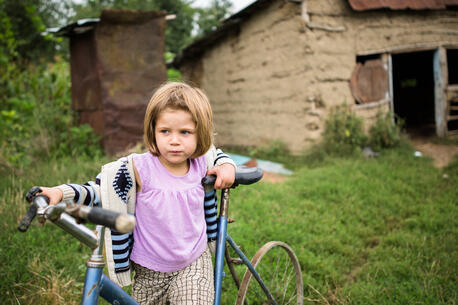
UNICEF Innocenti Report Card 18: Child Poverty in the Midst of Wealth
Child poverty is a critical threat to the well-being and health of societies. Addressing it is not only a moral imperative but also an investment in the well-being and future prosperity of a nation. The latest report from UNICEF Innocenti – Global Office of Research and Foresight takes a closer look at child poverty in high-income countries, including the United States.
More than 1 in 5 children live in poverty in the world's 40 richest countries
A new Innocenti report compares 40 high- and upper-middle-income countries on issues related to child poverty, covering current levels, historic trends and projections of future trends in view of current crises.
The report was compiled by a team of UNICEF researchers who have been monitoring, measuring and comparing children’s well-being in OECD* and European Union member states since 2015, the year the international community agreed to a set of Sustainable Development Goals. SDG 1 is a pledge to end extreme child poverty by 2030. It is also a call for multidimensional child poverty – a measure of poverty that goes beyond income – to be reduced by half.
"Child Poverty in the Midst of Wealth" is the team's 18th Report Card on progress toward the SDGs. It provides a detailed analysis of policy responses to child poverty in 40 countries, including the United States, along with recommendations for action.
Key findings:
At the end of 2021, a time of general prosperity, there were still more than 69 million children living in poverty in some of the world’s richest countries.
Some countries have seized the opportunity to address child poverty, while others have not.
France, Iceland, Norway, Switzerland and the U.K. saw sharp rises in child poverty between 2014 and 2021.
Poland and Slovenia have fared best in their efforts to tackle child poverty, followed by Latvia and South Korea; in contrast, some of the wealthiest nations in the report are lagging behind, near the bottom of country rankings.
More than 1 in 4 children live in poverty in Bulgaria, Colombia, Italy, Mexico, Romania, Spain, Türkiye and the U.S.
Children who experience poverty have less chance of completing school and earn lower wages as adults; in some countries, a person born in a deprived area is likely to live eight to nine years less than a person born in a wealthy area.
Prolonged periods of poverty can have a particularly corrosive effect; children who experience persistent poverty are more than twice as likely to have emotional and behavioral difficulties as children who experienced poverty at one point in time.
Poverty is not just about money: millions of children go without adequate heat at home or proteins in their diet; they do not have phones or go on vacations or have birthday parties — material and social deprivations that can also have lasting consequences.
Focusing on national child poverty averages in wealthy nations can obscure the huge inequalities in poverty risks; children living in a lone-parent family are over three times as likely to be living in poverty as other children, and children with disabilities and from minority ethnic/racial backgrounds also face higher-than-average risks. In Canada, for example, 37.4 percent of First Nations children who live on reserves lived in income poverty, compared with 10.8 per cent of non-indigenous children.
Report Card 18 includes recommendations for action related to expanding social protection, improving access to essential services (like childcare and free education), creating employment opportunities with adequate pay and families friendly policies (like paid parental leave), reducing inequalities in poverty risks, generating better data and involving children in the poverty debate.
Slovenia was able to make great strides toward reducing poverty by improving living standards by increasing the minimum wage, and Poland was able to do it by increasing cash benefits for families in need, the report notes. Elsewhere, however, cash assistance is often not generous enough to have a meaningful impact.
"The impacts of poverty on children are both persistent and damaging," said Bo Viktor Nylund, Director of UNICEF Innocenti – Global Office of Research and Foresight. “A lot can be learned from the successes of different countries. How we use this learning will determine how effectively we can ensure children’s well-being today and in the future.”
Read the Innocenti report Read the executive summary
U.S. RC18 Supplemental Report
UNICEF USA developed "Spotlight on Child Poverty in the United States" as a supplement to the UNICEF Innocenti Report Card 18 to provide a more detailed look at domestic child poverty and potential solutions — drawing lessons from measures implemented during the COVID-19 pandemic, such as the expanded Child Tax Credit.
The report delves into the issues and impacts of poverty on children and families and evidence-backed policies and programs that offer opportunities to mitigate those impacts, then offers directions for action for further consideration.
The U.S. is a large and complex country, and child poverty is a difficult issue to solve — but not impossible, the authors wrote. "Through low-barrier, universal or nearly universal anti-poverty policies and programs, the United States can end child poverty."
Read the UNICEF USA report Read the executive summary
*OECD stands for the Organization of Economic Cooperation and Development, a forum for collaboration among 37 democracies and market-based economies. Member countries include Australia, Austria, Belgium, Canada, Chile, Colombia, Costa Rica, Czechia, Denmark, Estonia, Finland, France, Germany, Greece, Hungary, Iceland, Ireland, Israel, Italy, Japan, Korea, Latvia, Lithuania, Luxembourg, Mexico, Netherlands, New Zealand, Norway, Poland, Portugal, Slovakia, Slovenia, Spain, Sweden, Switzerland, Türkiye, United Kingdom and the United States.
EU member states not included in the OECD: Bulgaria, Croatia, Cyprus, Malta and Romania.